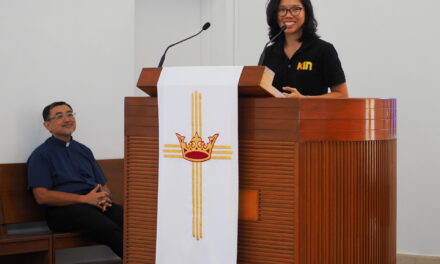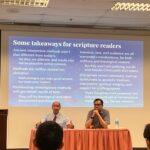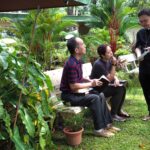
Course Descriptions
Course Descriptions – Core
Theological Studies and Ministry
This introductory course gives an overview of the theological curriculum and explains how the different disciplines relate to and complement each other. Furthermore, it will explore how theological studies are relevant to the Christian ministry. Basic study skills will also be taught.
Old Testament I
Old Testament I introduces the Pentateuch/Torah (Genesis – Deuteronomy) and the Former Prophets/Nevi’im (Joshua – 2 Kings). The focus will be on providing introductions to the respective books from historical, compositional, literary, and theological perspectives. In addition, the engagement with critical issues such as historical, source, and redaction criticisms will be directed towards gaining insights into the texts.
Old Testament II
Old Testament II covers the Latter Prophets (the major and minor prophets) and the Writings (poetic, wisdom, apocalyptic, and historical literatures). The focus will be on providing introductions to the respective books from historical, compositional, literary, and theological perspectives. In addition, the engagement with critical issues such as historical, source, and redaction criticisms will be directed towards gaining insights into the texts. [Pre-requisite: Old Testament I]
OT Theology
The course will discuss the different views of what constitutes ‘Old Testament Theology’ that are current today. This will include discussion of debates such as the ‘centre’ debate, the descriptive/normative debate and the canonical debate. Selected themes that run through the Old Testament will also be traced. In addition, there will be some discussion as to what extent, if any, the Old Testament addresses selected modern questions of life in our world today.
New Testament I
This course explores the multi-faceted background of the NT, and introduces the literature and theology of the four Gospels. A survey of the history of the Jewish people from the Maccabean Revolt (167 BCE) to the demise of the Jewish state in 135 CE will be carried out, with special attention being given to the developments in Judaism during this period. This historical survey provides a basis for an introductory study of the four Gospels. Critical methods will be introduced in order to equip students with the necessary tools to appreciate and understand the message of the Gospels. To round off the course, some passages from the Gospels will be studied.
New Testament II
This course explores the growth and message of the Early Church against the cultural and religious background of the 1st century. It includes the study of the nature and purpose of the NT writings that focus on the post-Easter period – Acts, the Pauline letters, the general letters and Revelation. Critical issues relating to their interpretation will also be discussed, along with a brief exploration of the theology of these writings. [Pre-requisite: New Testament I]
NT Theology
This course seeks to help students understand the theology of the New Testament against the backdrop of the developing Church in the 1st century, with special emphasis on Jesus and Paul. The important phenomenon of unity-in-diversity of the New Testament writings and the different proposals scholars have made for defining their centre will also be examined. As the study of the theology of the New Testament cannot be done in vacuum, there will also be a discussion, albeit brief, on the history of the discipline together with the presuppositions and critical methodologies of prominent scholars in this discipline.
Theology I: God and Creation
Nothing is more foundational in theology than a right understanding of God. The doctrine of God one espouses largely controls other areas of life and thought. This course introduces the study of theology by examining the foundational issues involved in our creaturely attempt to know God. It offers an orderly account of the doctrines of revelation (the sources of theology), God (the object of theology), creation (the context of theology), humanity (the subject of theology), and sin (the problem of theology). Taken together, the above account makes up the prelude to the redeeming work of God in the person of Jesus Christ.
Theology II: Christ and Salvation
In Theology II: Christ and Salvation, we focus on the doctrine of Christ (Christology) and the salvation that is made possible through him and in him (Soteriology). The lectures will be divided further into three main components: i) the person of Christ; ii) the work of Christ, and iii) the salvation he brings and how that salvation is effected in us. In i), we will discuss the biblical titles as applied to Christ, the development of Christology in the early church leading to the Christology of the Creeds, an in-depth discussion of the hypostatic union, and modern Christologies today. In ii), we will look at the significance of Christ’s incarnate life summarised by his humiliation (his obedience leading to his death on the cross) and his exaltation (his resurrection, ascension, and impending return), with a particular focus on the atonement. Finally, in iii), we will look at the various ‘aspects’ of salvation ranging from election and predestination, conversion and regeneration, justification, sanctification, preservation and perseverance, and glorification, with all these aspects grounded in our union with Christ. It is hoped that through Theology II, students will once again see afresh the good news of our Lord Jesus Christ and be rekindled in our love and devotion to him.
Theology III: Spirit and the Church
There are three sections in this unit: the Holy Spirit, the Church and the Last Things. This unit reflects the doctrinal content of the third article of the creed. The first section will examine the relationship of Christ to the person and work of the Holy Spirit. The second section will examine the work of the Holy Spirit in the Church, what is the church and the function of the gifts of the Spirit, which includes the means of the Spirit which are the sacraments of Baptism and Holy Communion. The third section will examine the work of the Spirit in bringing about the completion of the work of sanctification in the last days leading to the new creation. As a whole, this unit helps students receive the dogmatic tradition of the church in critical conversation with scripture and contemporary theology.
Christian Ethics
This introductory course will explore a selection of theological approaches to Christian ethics and draw on the resources available to us to help us grapple with ethical issues in our complex world. We will ask what contributions our faith community can offer to the formation of Christian character and the public debates on moral issues. [Pre-requisite: OT I,II; NT I, II; History of Global Christianity I,II; Theology I,II, III; Theology III can be taken concurrently with Christian Ethics]
History of Global Christianity I
This course provides an overview of the development of the Church in history, both in the West and other parts of the world. Its main focus is on the key events, figures and issues which have shaped this development. History of Global Christianity I surveys the developments from the apostolic age to the dawn of the Reformation.
History of Global Christianity II
This course provides an overview of the development of the Church in history, both in the West and other parts of the world. Its main focus is on the key events, figures and issues which have shaped this development. History of Global Christianity II covers the significant proceedings of the Reformation to our present day. [Pre-requisite: History of Global Christianity I]
History of Global Christianity III
This course equips students to understand the historical undercurrents that are shaping churches in Asia at the beginning of the twenty-first century, with particular emphasis in Southeast Asia. The course explores (1) legacies of the colonial and missionary era; (2) twentieth century missionary and ecumenical movements; and (3) church history at the time of nation-building. Basic historiographical skills will be taught. The course equips participants to arrive at a critical and theological appreciation of primary source documents. [Pre-requisite: History of Global Christianity II]
Field Education Visitation and Discussion
The purpose of the field education (FE) visitation and discussion is to provide students with the opportunity to observe and learn the diverse ministries in God’s Kingdom. Students will visit Anglican, Lutheran, Methodist, Presbyterian and other churches. Students will have opportunities to dialogue with the pastor(s) and/or leaders, and interact with members of these churches. This is a pre-requisite to FE Seminar and Placement I.
Field Education Seminar and Placement I/II
Field Education Seminar and Placement is an educational method that seeks to incorporate in the curriculum regular, supervised and evaluated opportunities of interrelating theological learning and experience in actual ministry for the students. The students are to grow through ministry and develop an intimate relationship with Christ that He may speak through them and that people may see in them and in their service the love and compassion of the Master Himself.
The seminars conducted in a classroom setting is to enable students to reflect on and discuss in connection with Biblical examples, principles and practices, their field education experiences. It seeks to help students understand the various ministries in the Church and reflect on ministry issues, to affirm their calling and ministry, and to formulate their own philosophy of ministry.
[Pre-requisite of FE Seminar and Placement I: Field Education Visitation and Discussion]
[Pre-requisite of FE Seminar and Placement II: Field Education Seminar and Placement I and FE Internship]
Field Education Internship
During 4 weeks of a long vacation (vacation between the two FE Seminar and Placement I and II), students will participate in a church, parachurch organization or mission in full time ministry.
Introduction to Biblical Interpretation
This introductory course will deal with issues and challenges entailed in understanding the biblical text, as well as provide foundational tools in cultivating skills in reading, understanding and applying the Bible. Special attention will be given to the different literary genres in Scripture, with instructions on how to discern God’s Word for today through the different literary forms. This course aims to prepare students for advanced courses in biblical exegesis, as well as provide them with the necessary hermeneutical skills for teaching and expository preaching.
Worship and Liturgy
This course aims to equip students for the ministry of worship by providing both the theological/historical basis for worship as well as practical training in worship leadership, e.g. crafting and praying the prayers of intercession, reading scriptures and liturgical texts, and selecting congregational songs. The major foci will be the Sunday service of word and sacrament, baptism, marriage, and the Christian funeral.
Music for Ministry
This course is designed to help worship leaders and pastors appreciate the theological and ministerial functions of music in ministry, and develop rudimentary skills in leading worship more effectively.
Mission and Evangelism
This course provides an overview of the biblical and historical foundations for mission and its practice. It examines the theology of mission in the Old and New Testaments, introduces students to key events in the story of the expansion of the Christian Church. It also focuses on the place and practice of evangelism and mission within and beyond the context of the local church, including consideration of the content and approaches of evangelism, methods of evangelism and follow-up, equipping and mobilisation. An introduction will be given to the issues which emerge in cross-cultural evangelism and the relationship of evangelism and social action. The development of a mission programme and suitable structures within the local church for the promotion and practice of mission will also be discussed with opportunity for the formulation of appropriate strategies.
Pastoral Theology and Praxis I & II
Pastoral Theology and Praxis I & II is a two-part course comprising two three-credit hour courses that will be delivered over two semesters in an academic year. The tight coupling of theology and praxis in the design of this course reflects the need to preserve the relationship between theology and practice in the field of pastoral theology, a need that is made more pressing by the confluence of literature that evidence a divorce between theological or doctrinal rationale and pastoral practice in the Christian church. It is hoped that, by nurturing the acumen to think theologically on pastoral issues and to form pastoral responses that are theologically-informed, students in this field will embark on a journey to become pastoral theologians.
The course adopts a historical approach in its retrieval of scripture and documents pertaining to pastoral theology particularly in the classical tradition. Principles for an understanding of pastoral theology and praxis are identified and brought into conversation with challenges that confront the pastoral office in the contemporary church.
Major areas that will be addressed include (1) the pastoral identity and vocation (2) the pastor’s spiritual life and character, (3) the pastoral office and the ministry of word and sacrament, and (4) the pastoral office and the curating of soul and pastoral care-giving. Particular attention is paid to the pastoral office from the shepherding perspective as opposed to other contemporary images.
Homiletics I
A good sermon needs to be conceived pastorally, constructed purposefully and communicated prayerfully. Homiletics I concentrates on the conception and construction of the sermon i.e. it aims to help students learn how to ‘design’ and ‘develop’ a good sermon. Although some practice and practical suggestions on effective communication or ‘delivery’ of the sermon will be offered in Homiletics I, it is in Homiletics II that more time and emphasis will be devoted to this.
Homiletics II
This course assumes that the theoretical fundamentals of what constitutes good preaching have been discussed and understood by students in Homiletics I. Homiletics II is primarily devoted to giving students practical suggestions and practice in preaching a sermon of 20 minutes in front of the class and a video camera. The learning strategy is thus primarily through practice and constructive criticism. [Pre-requisite: Homiletics I]
Integrative Seminar
As the name suggests, this is an advanced seminar that is designed to provide training for final year students to integrate different fields of study in their theological curriculum. It will be issue driven, and two topics of current interest will be chosen each year. The seminar will be led by a team of lecturers from the fields of biblical, theological, historical and pastoral studies. [Pre-requisite: Graduating student]








